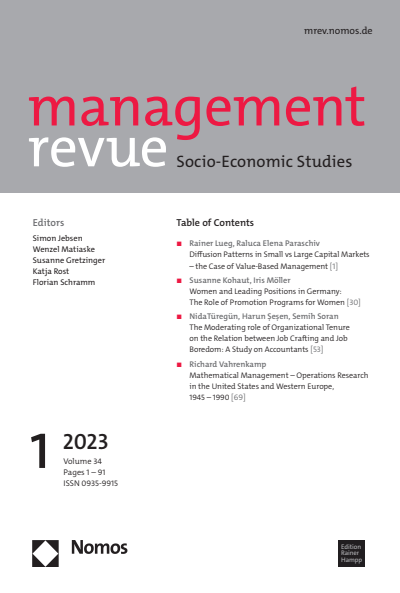The Mutual Interaction of Employee Empowerment and Digital Innovation: A Case Study About an Employee-Initiated AR/VR Sales Tool at a German Trade Fair Company
IF 1.7
0 MANAGEMENT
引用次数: 0
Abstract
In times of digital transformation, the voice and participation of employees become increasingly important since employees and the knowledge they provide are recognised to be the main asset of every firm, driving innovation. Hereby, digital technologies can have a strong impact on employee empowerment as new means of engagement become feasible, triggering digital innovation. Despite this development, we observe a lack of research on the mutual interaction of employee empowerment and digital innovation. The reason for this is that prior studies predominately focus on one efficient direction: either digital technologies affecting empowerment or employees affecting the innovation process in the course of employee-driven innovation (EDI). This study, therefore, aims to contribute to an understanding of the interface between the two above-mentioned directions. To investigate the research topic, the Adapted Structuration Theory (AST) of DeSanctis and Poole is used as a theoretical lens. We conduct a structured literature review, followed by an in-depth case study of an employee-initiated augmented reality / virtual reality (AR/VR) sales tool. The findings emphasize the strong mutual interaction between employee empowerment and digital innovation on the different levels of employee, management and organisation. The study holds contributions to theory and practice by extending the adapted AST and by offering guidance on how to facilitate employee empowerment in the digital age.员工授权与数字创新的相互作用:以德国一家贸易展览公司员工发起的AR/VR销售工具为例
在数字化转型时代,员工的声音和参与变得越来越重要,因为员工及其提供的知识被认为是每个公司的主要资产,推动着创新。因此,数字技术可以对员工授权产生强烈影响,因为新的参与手段变得可行,从而引发数字创新。尽管有了这样的发展,但我们观察到缺乏对员工授权和数字创新相互作用的研究。这是因为以往的研究主要集中在一个有效的方向:要么是数字技术影响授权,要么是员工影响员工驱动的创新过程。因此,本研究旨在有助于理解上述两个方向之间的接口。本文以DeSanctis和Poole的自适应结构理论(adaptive structure Theory, AST)作为研究视角。我们进行了结构化的文献综述,然后对员工发起的增强现实/虚拟现实(AR/VR)销售工具进行了深入的案例研究。研究结果强调,在员工、管理层和组织的不同层面上,员工赋权与数字创新之间存在着强烈的相互作用。该研究对理论和实践都有贡献,它扩展了经过调整的AST,并就如何在数字时代促进员工赋权提供了指导。
本文章由计算机程序翻译,如有差异,请以英文原文为准。
求助全文
约1分钟内获得全文
求助全文
来源期刊

Management Revue
MANAGEMENT-
CiteScore
1.20
自引率
0.00%
发文量
7
期刊介绍:
Management Revue - Socio-Economic Studies is an interdisciplinary European journal that undergoes peer review. It publishes qualitative and quantitative work, along with purely theoretical papers, contributing to the study of management, organization, and industrial relations. The journal welcomes contributions from various disciplines, including business and public administration, organizational behavior, economics, sociology, and psychology. Regular features include reviews of books relevant to management and organization studies.
Special issues provide a unique perspective on specific research fields. Organized by selected guest editors, each special issue includes at least two overview articles from leaders in the field, along with at least three new empirical papers and up to ten book reviews related to the topic.
The journal aims to offer in-depth insights into selected research topics, presenting potentially controversial perspectives, new theoretical insights, valuable empirical analysis, and brief reviews of key publications. Its objective is to establish Management Revue - Socio-Economic Studies as a top-quality symposium journal for the international academic community.
 求助内容:
求助内容: 应助结果提醒方式:
应助结果提醒方式:


